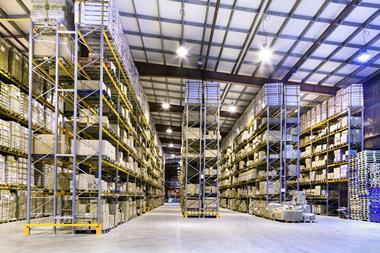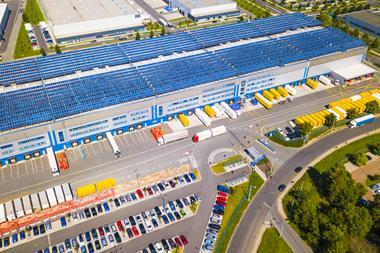The Suez Canal and Red Sea route is an important global trade artery, not just for manufactured goods but also for oil and gas. Any protracted disruption could be inflationary for the wider economy and the construction sector specifically.

This isn’t an entirely new situation – the stranding of the Ever Given in the Suez Canal in 2021 held up an estimated £7bn of goods a day – but the context is completely different, and there’s no clear end in sight.
A stuck container ship was a logistical and financial headache, particularly coming in the wake of pandemic lockdowns, but it was a clearly defined problem to solve. Resolving the issues around attacks on a global shipping route, proclaimed as a response to conflict in the Middle East, is distinctly less so.
While airstrikes from a US-led coalition have attempted to ‘degrade the capabilities’ of the Houthis, the rebels have so far continued to target cargo ships in the region.
Construction increasingly relies on imported materials and components to function efficiently. These are now often part of a ‘just-in-time’ delivery strategy, which dispenses with the need to stockpile, but is an approach that relies on supply chains working seamlessly. The current situation will likely affect the working of that supply chain if the crisis lasts for any length of time.
Figures from the Department for Business and Trade put the value of imported construction materials into the UK in 2023 at around £25bn per year. The top five imported materials were electrical wires, sawn wood, air-conditioning equipment, structural steel and linoleum floorcoverings.
The largest proportion of imports came from China, accounting for about 20% of the total. Imports from Asia usually transit the Suez Canal and are therefore likely to be affected by the ongoing situation in the Red Sea.
The situation, although fluid, is that most ships are now taking the longer route around the Cape of Good Hope in South Africa to avoid transiting the Suez Canal. This adds an estimated 10 to 12 days to the shipping time from Asia, and will no doubt increase the cost of containers arriving in Europe, not to mention the additional environmental impact from increased emissions.
The extra costs will inevitably be passed on by the shipping companies to the manufacturers, which in turn will pass them on to their ultimate consumers.
The severity of any impact will be governed by the length of time the problems persist for. If there is protracted disruption then the likelihood is that some inflationary impacts will start to seep through to construction on the ground, driven by some shortages and cost increases.
However, the volume of attacks hasn’t escalated since the US-led coalition-initiated airstrikes, and therefore the likelihood is that any impact will be relatively benign over the medium term. In the short term, though, there will be higher freight costs and slower deliveries, which could prove to be inflationary.
To mitigate any potential impacts, supply chain managers could start to stockpile materials that they know will be needed, consider air freight as an alternative or seek import sources closer to the UK, thus avoiding the Red Sea route.
The situation doesn’t seem to have reached crisis levels for the construction industry and property sector specifically, but developers and contractors may want to act now to avoid the worst of any potential impacts that may develop if the crisis was to deepen or persist for any length of time.
After coming through soaring inflation, which saw materials costs skyrocket, and the industry eagerly anticipating an easing in interest rates accordingly, the Red Sea attacks are yet another demonstration of how vulnerable construction is to external forces and, significantly, to geopolitical events.
Far from leaving behind a period of uncertainty, events in 2024 have the potential to pile further pressure on the industry. Aside from domestic politics and the UK general election, it is a global election year with some 76 countries scheduled to hold elections in 2024.
Changes in governance and shifting policies will have far-reaching ripple effects, both at home and abroad.
Many of these could have an impact on resources relied upon in the property sector, not least a steady and reliable supply of materials and components to site. After Brexit, Covid-19 and Russia’s invasion of Ukraine, the construction industry has had to become more resilient.
The Red Sea is a further test, but it’s unlikely to be the last of the year, and maybe not even of the quarter.
Dr David Crosthwaite is chief economist at the Building Cost Information Service





























No comments yet